Mental fatigue can severely hinder athletic performance, affecting focus and recovery. This article explores the causes of mental fatigue, including overtraining and poor nutrition. It examines effective strategies such as structured rest, mindfulness practices, and proper nutrition to enhance recovery. Additionally, it highlights cultural perceptions and current limitations in mental recovery methods, providing best practices for athletes to optimize their mental resilience and performance.

What is Mental Fatigue and How Does it Affect Athletic Performance?
Mental fatigue significantly impairs athletic performance by reducing focus, motivation, and overall physical output. It manifests through prolonged mental strain and can hinder recovery processes, leading to decreased training effectiveness. Effective strategies to combat mental fatigue include structured recovery routines, mindfulness practices, and adequate sleep, all of which enhance performance outcomes. Addressing mental fatigue is crucial for athletes aiming to optimize their training and competition results.
What are the signs and symptoms of mental fatigue in athletes?
Mental fatigue in athletes manifests through various signs and symptoms. Common indicators include decreased motivation, increased irritability, difficulty concentrating, and a decline in performance. Athletes may also experience physical symptoms such as headaches, sleep disturbances, and fatigue. Recognising these signs is crucial for effective recovery and maintaining optimal performance.
How does mental fatigue differ from physical fatigue?
Mental fatigue differs from physical fatigue primarily in its origins and effects. Mental fatigue arises from cognitive processes, leading to decreased focus and decision-making ability, while physical fatigue results from exertion, manifesting as muscle weakness and reduced stamina. Both types of fatigue impact athletic performance, but mental fatigue can hinder recovery by affecting motivation and mental resilience. Addressing mental fatigue through strategies like mindfulness and rest can enhance overall athletic recovery and performance.
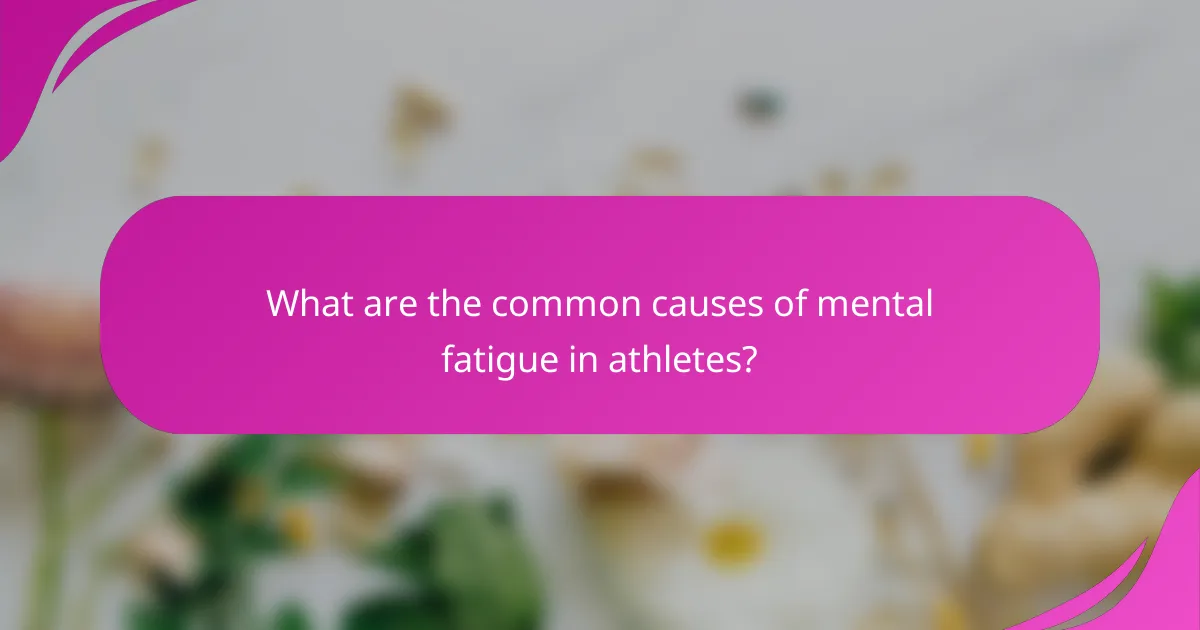
What are the common causes of mental fatigue in athletes?
Common causes of mental fatigue in athletes include overtraining, lack of sleep, poor nutrition, and high stress levels. These factors can diminish focus, motivation, and overall performance. Overtraining leads to physical and mental exhaustion, while inadequate sleep affects recovery and cognitive function. Poor nutrition deprives the body of essential nutrients, further contributing to fatigue. High stress levels, whether from competition or personal life, can also significantly impact mental resilience. Addressing these causes is crucial for enhancing athletic recovery and performance.
How do training schedules contribute to mental fatigue?
Training schedules significantly contribute to mental fatigue by imposing physical and cognitive demands on athletes. Consistent high-intensity training can lead to overtraining, which negatively impacts mental resilience and recovery. As a result, athletes may experience decreased motivation, increased anxiety, and impaired decision-making. Balancing training intensity and recovery is essential for mitigating mental fatigue and enhancing overall performance.
What role does competition stress play in mental fatigue?
Competition stress significantly contributes to mental fatigue, impacting athletic performance and recovery. High-pressure environments can drain cognitive resources, leading to decreased focus and motivation. Athletes often experience unique attributes of stress, such as anxiety and pressure to perform, which exacerbate mental fatigue. Effective recovery strategies, including mindfulness and relaxation techniques, can help mitigate these effects and enhance overall performance.
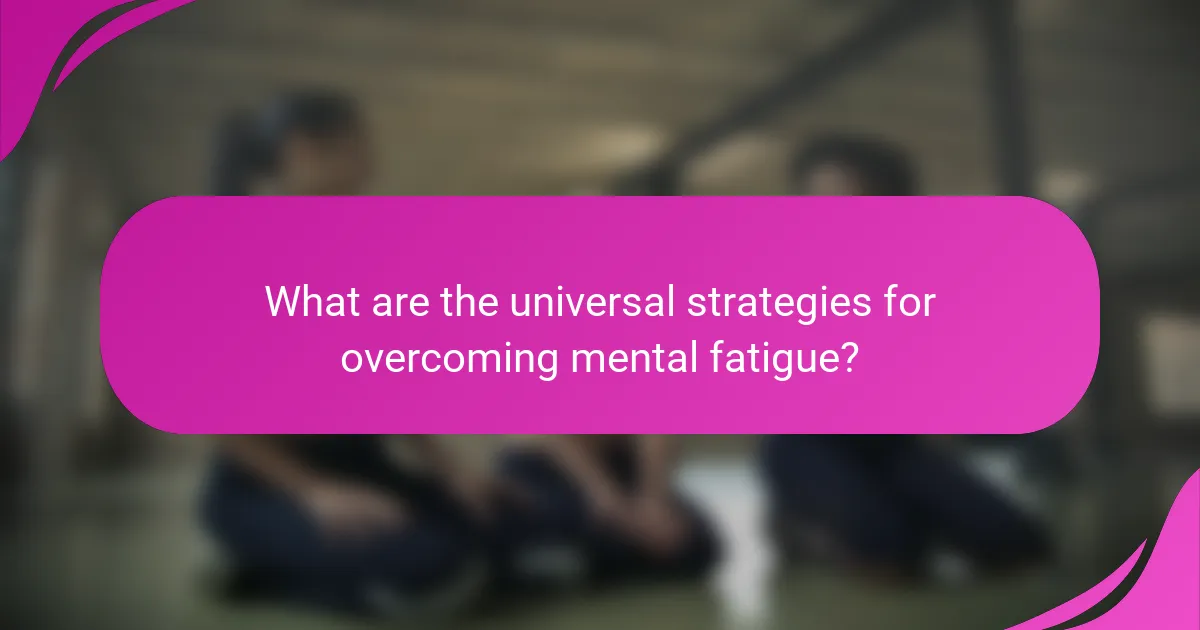
What are the universal strategies for overcoming mental fatigue?
To overcome mental fatigue, athletes can adopt strategies such as structured rest, mindfulness practices, and proper nutrition. These techniques enhance recovery and boost performance. Structured rest allows the brain to recharge, while mindfulness reduces stress and improves focus. Nutrition plays a critical role, as balanced meals provide essential energy and nutrients. Incorporating these strategies leads to improved mental clarity and athletic output.
How can proper rest and recovery enhance mental resilience?
Proper rest and recovery significantly enhance mental resilience by reducing fatigue and improving focus. Quality sleep and recovery practices allow athletes to recharge mentally, leading to better decision-making and performance. Research indicates that adequate rest can improve cognitive functions by up to 20%, allowing athletes to maintain high levels of concentration during competition. Additionally, structured recovery routines, such as active recovery and mindfulness techniques, foster a positive mindset, further enhancing mental strength. Prioritising rest not only aids physical recovery but also cultivates a resilient mental state essential for peak athletic performance.
What nutritional strategies support mental clarity and focus?
Balanced nutrition enhances mental clarity and focus by providing essential nutrients. Key strategies include consuming omega-3 fatty acids, antioxidants, and hydration. Omega-3s, found in fatty fish, improve cognitive function. Antioxidants from fruits and vegetables protect brain cells from oxidative stress. Staying hydrated supports overall brain performance, as dehydration can impair concentration.
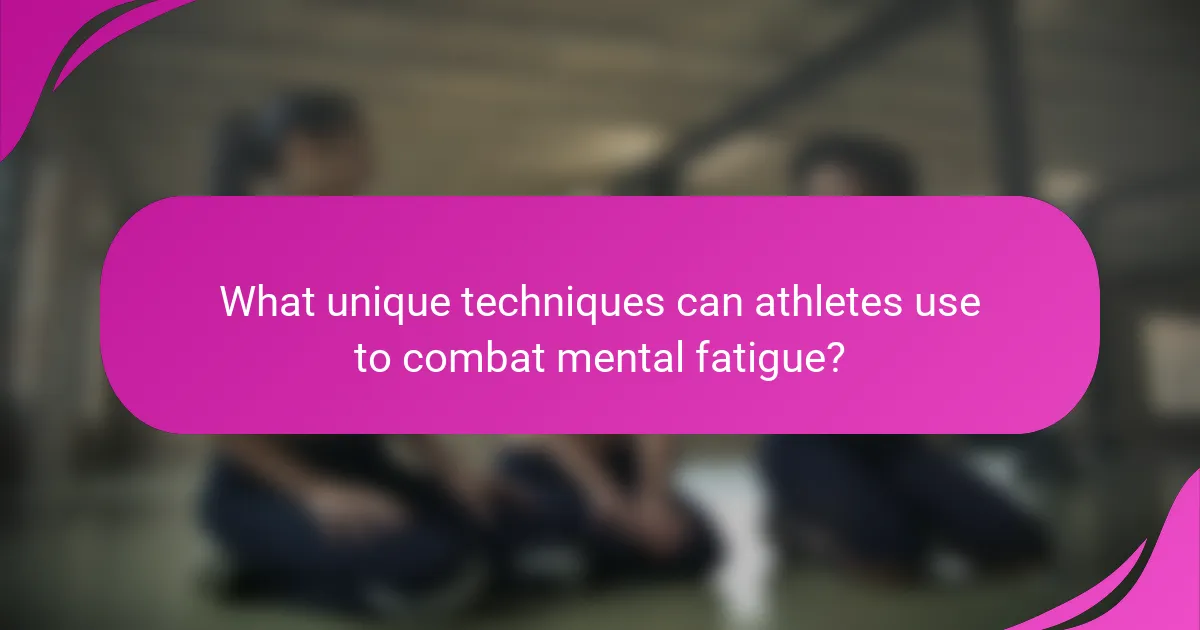
What unique techniques can athletes use to combat mental fatigue?
Athletes can use techniques like mindfulness, visualization, and structured rest to combat mental fatigue. Mindfulness enhances focus and reduces stress, while visualization strengthens mental resilience. Structured rest allows for recovery, preventing burnout. Incorporating these practices can lead to improved performance and overall well-being.
How can mindfulness and meditation improve mental recovery?
Mindfulness and meditation enhance mental recovery by reducing stress and improving focus. These practices promote relaxation, allowing athletes to recover more effectively. Research shows that regular meditation can decrease anxiety levels by up to 60%, which is crucial for optimal performance. Additionally, mindfulness fosters a greater awareness of bodily sensations, helping athletes identify and address fatigue more efficiently.
What role does visualization play in overcoming mental barriers?
Visualization significantly aids in overcoming mental barriers by enhancing focus and motivation. Athletes who visualize successful performances often experience reduced anxiety and improved confidence. This technique activates neural pathways similar to actual performance, reinforcing skills and mental resilience. Studies show that consistent visualization can lead to measurable improvements in athletic recovery and overall performance, making it a unique attribute in mental training.
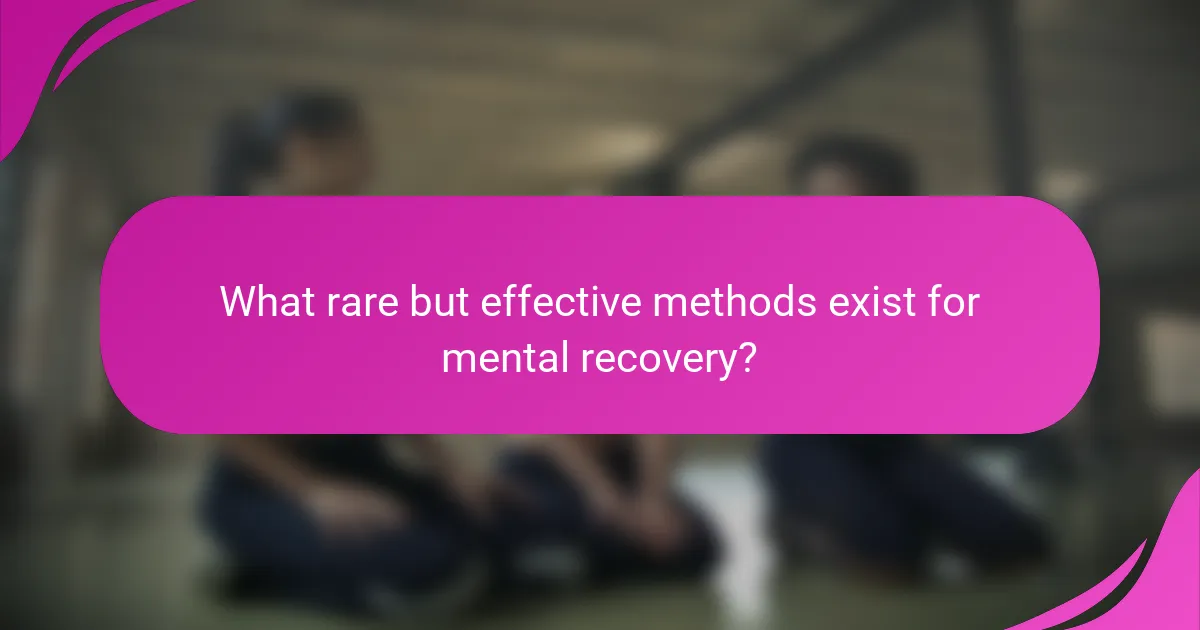
What rare but effective methods exist for mental recovery?
Mindful movement practices, such as tai chi and qigong, promote mental recovery through gentle, flowing exercises. These methods enhance body awareness and reduce stress, leading to improved focus and performance. Incorporating nature therapy, like forest bathing, offers rare but effective mental rejuvenation by immersing individuals in natural environments. This practice boosts mood and cognitive function, supporting athletes in overcoming mental fatigue. Additionally, creative arts therapies, including music and art, provide unique outlets for emotional expression and mental clarity, facilitating deeper recovery processes.
How can biofeedback be utilized in mental fatigue recovery?
Biofeedback can significantly aid in mental fatigue recovery by enhancing self-regulation and awareness. It allows athletes to monitor physiological signals, such as heart rate and muscle tension, helping them identify stress responses. By utilizing biofeedback techniques, athletes can learn to control these responses, promoting relaxation and mental clarity. This process supports enhanced recovery, ultimately improving performance. Studies indicate that consistent biofeedback practice can reduce perceived mental fatigue and increase overall resilience during training sessions.
What innovative technologies are emerging for mental performance enhancement?
Innovative technologies for mental performance enhancement include neurofeedback, virtual reality training, and cognitive training apps. Neurofeedback uses real-time brain activity data to improve focus and reduce stress. Virtual reality training immerses athletes in simulated environments to enhance decision-making and reaction times. Cognitive training apps provide personalised exercises to sharpen mental skills, improving overall performance. These technologies collectively address mental fatigue and promote recovery for athletes.
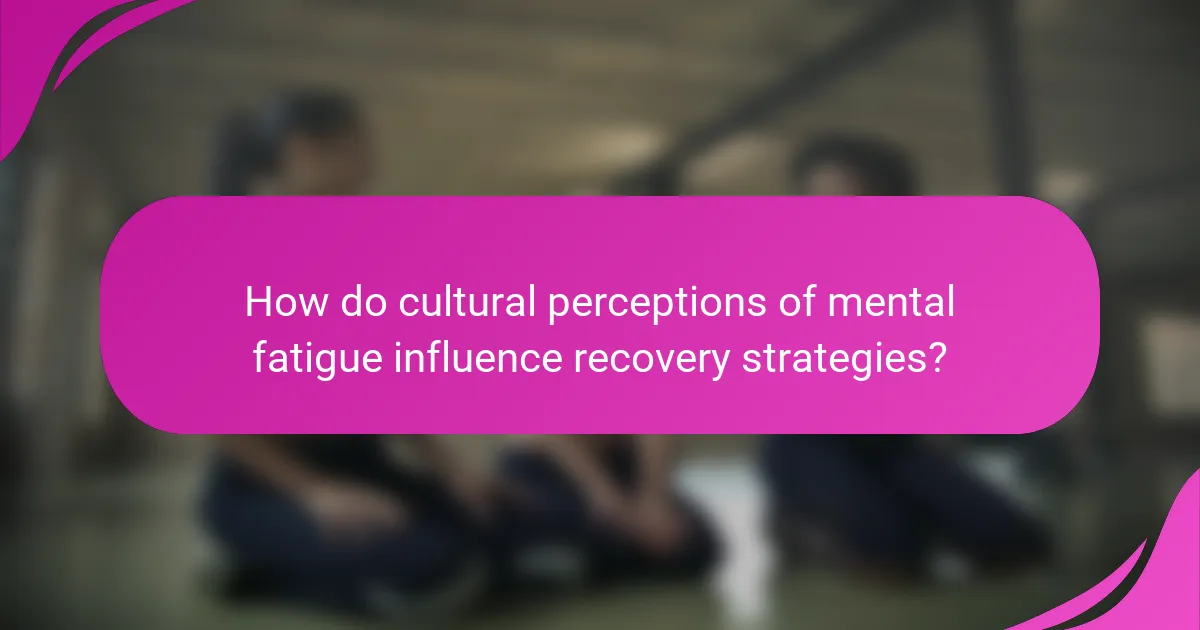
How do cultural perceptions of mental fatigue influence recovery strategies?
Cultural perceptions of mental fatigue significantly shape recovery strategies in athletics. Different cultures emphasize various approaches, such as mindfulness, communal support, and individual resilience. For example, Eastern cultures may prioritise meditation and holistic practices, while Western cultures often focus on structured training and performance metrics. These differing views influence how athletes perceive mental fatigue and their subsequent recovery methods. Understanding these cultural nuances allows for tailored recovery strategies that enhance athletic performance and well-being.
What are the common misconceptions about mental fatigue in sports?
Mental fatigue in sports is often misunderstood, leading to ineffective recovery strategies. Many believe it solely stems from physical exertion, overlooking its psychological aspects. Some athletes think mental fatigue is a sign of weakness, when it actually reflects the brain’s response to stress and overtraining. Additionally, there’s a misconception that rest alone can fully alleviate mental fatigue; in reality, techniques like mindfulness and focused recovery practices are essential for optimal performance. Understanding these misconceptions can enhance athletic recovery and overall performance.
How can athletes in different regions adapt recovery techniques?
Athletes in different regions can adapt recovery techniques by considering local climate, cultural practices, and available resources. For instance, in warmer climates, hydration and cooling techniques are crucial for recovery. In contrast, athletes in colder regions may focus on warmth and muscle relaxation methods. Cultural practices, such as traditional massage or herbal remedies, can also enhance recovery. Access to facilities like saunas or ice baths varies by region, influencing recovery strategies. Tailoring approaches to these factors ensures optimal recovery and performance.
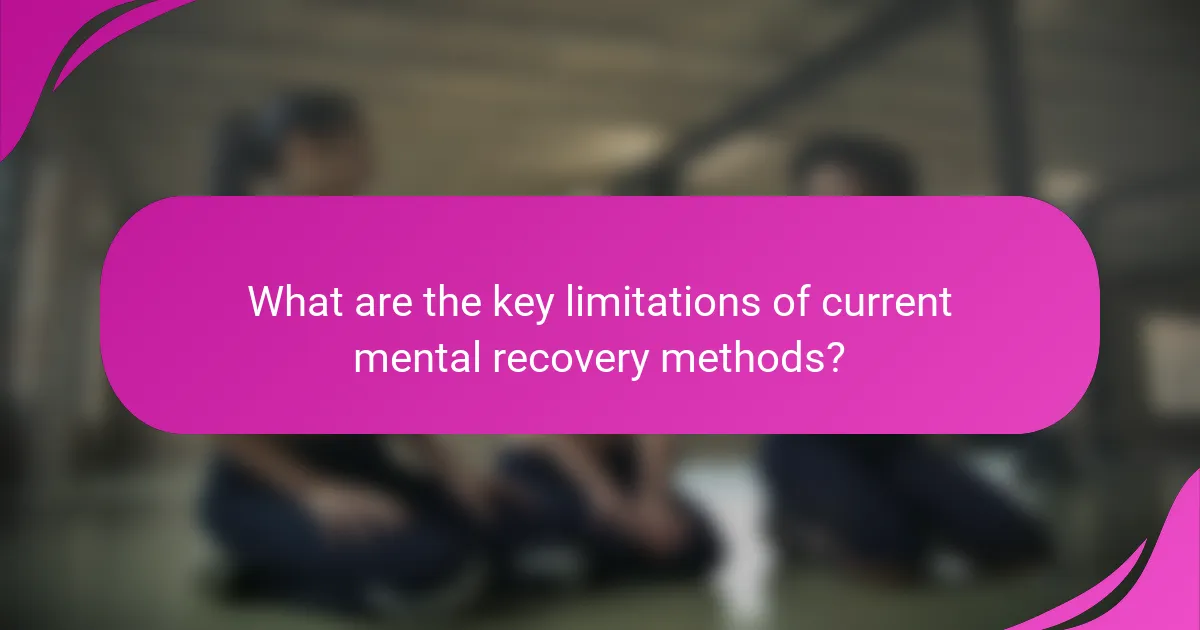
What are the key limitations of current mental recovery methods?
Current mental recovery methods often face key limitations that hinder their effectiveness. These methods may lack personalisation, failing to address individual athlete needs. They can also be time-consuming, requiring significant commitment without guaranteed results. Additionally, many approaches do not incorporate holistic practices, overlooking the interplay between mind and body. Lastly, reliance on outdated techniques can limit innovation, stalling progress in mental recovery strategies.
What challenges do athletes face in implementing effective strategies?
Athletes face significant challenges in implementing effective strategies due to mental fatigue and external pressures. Mental fatigue can hinder focus, decision-making, and recovery, impacting overall performance. External pressures include competition stress, media scrutiny, and expectations from coaches and fans. These factors create a complex environment that complicates the adoption of effective recovery strategies. As a result, athletes must develop resilience and mental discipline to overcome these barriers.
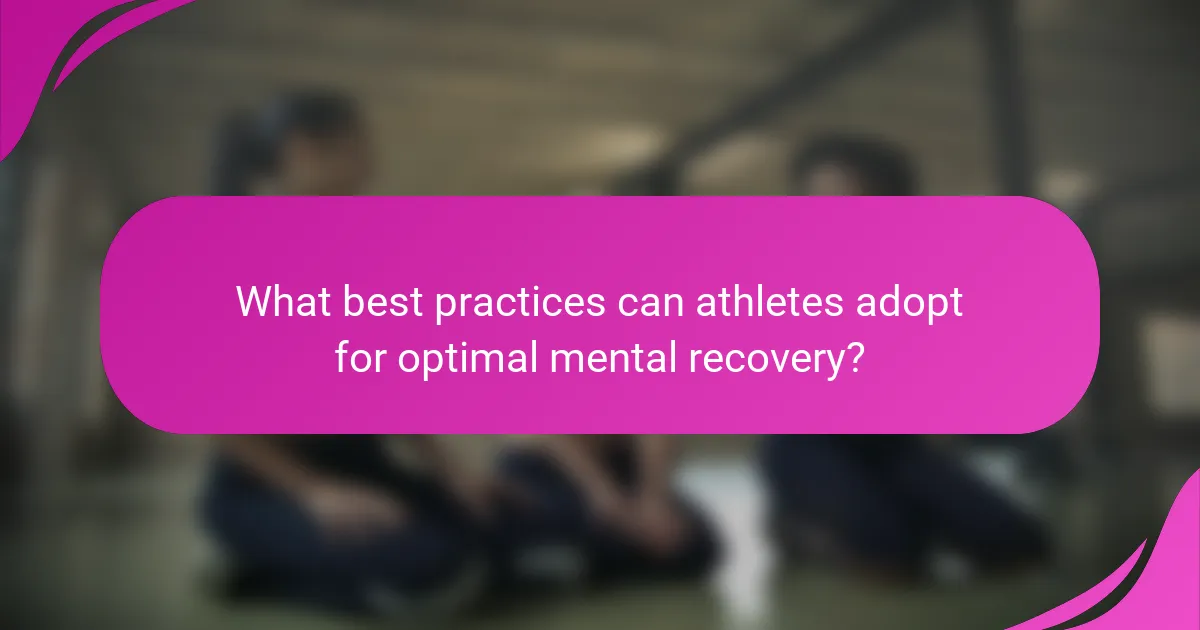
What best practices can athletes adopt for optimal mental recovery?
Athletes can adopt several best practices for optimal mental recovery, including mindfulness, structured rest, and goal-setting. Mindfulness techniques, such as meditation, help reduce stress and enhance focus. Structured rest involves scheduling downtime to allow the mind to recover, which is essential for overall performance. Goal-setting fosters motivation and provides clear direction, reducing mental fatigue. Engaging in enjoyable activities outside of sport can also promote a balanced mindset and aid recovery.
How can athletes create a personalized mental recovery plan?
Athletes can create a personalised mental recovery plan by assessing their unique stressors and recovery needs. Start by identifying specific mental fatigue triggers, such as competition pressure or training intensity. Incorporate mindfulness techniques, like meditation or visualization, to enhance focus and reduce anxiety. Establish a routine that includes regular check-ins on mental health, ensuring adjustments are made as needed. Utilise recovery strategies, such as journaling or talking with a sports psychologist, to reflect on experiences and emotions. This tailored approach fosters resilience and improves overall performance.
What common mistakes should athletes avoid in their recovery journey?
Athletes should avoid neglecting rest, ignoring nutrition, and skipping mental recovery practices. Prioritising these elements enhances overall performance and prevents burnout. Common mistakes include underestimating the importance of sleep, failing to hydrate adequately, and not addressing emotional fatigue. Recognising these pitfalls is essential for a successful recovery journey.
What expert insights can enhance understanding of mental fatigue recovery?
Expert insights emphasise the importance of structured recovery strategies for mental fatigue. Techniques such as mindfulness, adequate sleep, and focused rest periods can significantly enhance recovery. Research indicates that mental fatigue can impair performance, making these strategies essential for athletes. Incorporating regular mental breaks and relaxation techniques can foster better cognitive function and overall athletic performance.